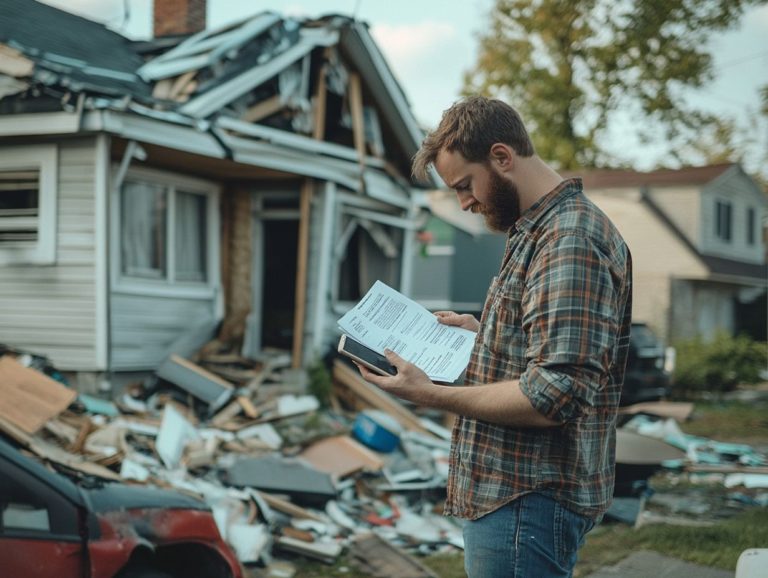What Are the Most Common Home Insurance Claims?
Home insurance can seem daunting, especially when the prospect of filing a claim looms on the horizon.
Understanding what your policy covers and the types of claims you may face is crucial for safeguarding your home. Whether it s damage from severe weather or the unfortunate event of theft, being aware of common pitfalls can save you time, money, and unnecessary stress.
Get ready to explore the ins and outs of home insurance claims! This article will cover the various types of claims, provide prevention tips, and outline the essential steps to take when it’s time to file a claim.
Prepare to navigate the complexities of home insurance with assurance and ease!
Contents
- Key Takeaways:
- Understanding Home Insurance Claims
- Types of Common Home Insurance Claims
- Preventing Common Home Insurance Claims
- What to Do When Faced with a Home Insurance Claim
- Frequently Asked Questions
- What should I do if my home is damaged and I need to file a claim?
- What is liability coverage and why is it important?
- What can I do to prevent common home insurance claims?
Key Takeaways:

- Weather-related claims are the most common. Expect issues from severe storms and hail.
- Water damage often results from burst pipes or leaky roofs. Regular maintenance can prevent this.
- To minimize risks, install security systems and address potential hazards quickly.
- If you need to file a claim, document everything and report it promptly.
Understanding Home Insurance Claims
Understanding home insurance claims is vital for protecting your property against potential liabilities and losses.
With climate risks and extreme weather events becoming more common, securing a comprehensive homeowners policy is essential to protect your investment.
Understand how insurance providers handle claims, what your homeowners insurance covers, and how your claims history can influence future premiums.
The insurance landscape is always changing, so you must stay informed about the latest trends and regulations that could affect your coverage limits and options.
What is Covered by Home Insurance?
Home insurance offers crucial coverage for various risks tied to property ownership, from damage to your home s structure to the safety of your personal belongings.
Typical homeowners insurance policies cover scenarios such as natural disasters, theft, and claims when someone gets hurt on your property, providing you with the peace of mind you deserve.
However, coverage specifics can differ significantly between insurance providers. It s essential to grasp the details of your homeowners policy to ensure you re adequately protected against potential losses.
Dwelling coverage protects the physical structure of your home, while personal property protection safeguards items within your home, like furniture and electronics, against loss or damage. Liability coverage is another vital aspect, as it shields you from financial repercussions if someone is injured on your property or if you accidentally cause damage to another person’s property.
By comparing coverage limits and policy details among different providers, you can make informed decisions and select the most suitable policy tailored to your unique needs.
Types of Common Home Insurance Claims
Home insurance claims can emerge from various incidents that homeowners may face. Understanding these claims is essential.
Common scenarios include weather-related claims, particularly those triggered by catastrophic events like hurricanes or flooding. You might also encounter water damage claims due to plumbing issues.
Liability claims can arise if someone gets hurt on your property, while theft claims address losses from property crimes. Each occurrence can significantly affect your insurance premiums and claims history, making it essential to stay informed.
1. Weather-Related Claims

Weather-related claims rank among the most prevalent types of insurance claims homeowners file, especially in areas susceptible to extreme weather and natural disasters. For detailed information, check out what to expect from home insurance claims.
Events like hurricanes, tornadoes, and floods can wreak havoc on properties. Many homeowners seek compensation through their home insurance policies.
It s vital for you to understand how these claims affect you, as they can significantly impact your insurance premiums and coverage limits over time.
For instance, a hurricane can unleash widespread flooding that damages not only the structure of your home but also your personal belongings. This reality makes it essential for property owners like you to periodically evaluate your coverage.
Similarly, hailstorms can necessitate roof repairs, and wildfires can destroy homes completely, underscoring the unpredictable nature of such occurrences. Recognizing these scenarios emphasizes the importance of regularly reviewing your insurance policies.
Adjust your coverage to protect against specific risks, particularly in regions increasingly affected by climate change. This proactive approach will help you be prepared for the worst when disaster strikes! Stay ahead of the game!
2. Water Damage Claims
Water damage claims account for a substantial share of home insurance claims, often stemming from issues like plumbing failures, roof leaks, or flooding. To navigate the claims process effectively, it’s crucial for you to understand the importance of thorough documentation.
Your ability to accurately document the damage can be pivotal in securing a successful claim and obtaining the average payout for water damage under your homeowners policy. While the causes of water damage may differ, the challenges in filing claims generally remain the same.
Many homeowners struggle with proving the extent of the damage or pinpointing its origins. To simplify this process, consider these best practices:
- Take detailed photographs of the affected areas.
- Keep receipts for any repairs made.
- Notify your insurance company promptly.
Familiarizing yourself with the specific terms of your policy can help you avoid unpleasant surprises during the claims process. By staying proactive and organized, you can significantly boost your chances of a seamless and successful claims experience.
3. Liability Claims
Liability claims in home insurance come into play when you find yourself responsible for injuries or damages someone else experiences on your property. These claims can have significant financial consequences, often resulting in higher insurance premiums and necessitating a clear understanding of the coverage limits within your homeowners policy.
It s essential to recognize your liability risks and ensure you have adequate protection against potential claims. Picture this: a guest slips on a wet floor, or perhaps a pet injures a visiting friend.
Incidents can even occur outside your home, like a tree crashing onto a neighbor’s property during a storm, sparking disputes and claims. Regularly evaluating your liability coverage limits is vital, especially if you have a swimming pool or trampoline, as these can elevate your risk.
By understanding the nuances of liability coverage options, you can effectively safeguard against unexpected financial repercussions, allowing you to enjoy peace of mind.
4. Theft Claims
Theft claims are an essential aspect of your home insurance, offering coverage for losses stemming from property crimes like burglary and vandalism. Act now to protect your valuables! The nature of these claims can impact your claims history, which in turn affects your insurance premiums.
By understanding what personal belongings are covered under your homeowners policy, you can better safeguard your investments. Typically insured items include electronics, jewelry, and furniture, but it’s crucial for you to review your specific policy to know what’s included and what’s not.
In terms of filing a claim, meticulous documentation is key; photographs, receipts, and police reports can be invaluable.
To proactively reduce the risk of theft, consider investing in robust security measures such as smart locks, security cameras, and adequate lighting around your property. Not only do these strategies deter potential intruders, but they also foster a sense of safety within your community.
Preventing Common Home Insurance Claims

Preventing home insurance claims saves you money and reduces stress.
Protecting your property from risks like water damage, theft, and liability can lower the chances of filing claims. This can positively impact your insurance premiums and overall coverage limits.
Working with your insurance agent offers valuable insights into effective risk management strategies tailored to your property s unique needs.
Tips for Reducing Risk and Avoiding Claims
You can implement several effective strategies to reduce risk and avoid claims, which may lead to lower insurance premiums and attractive discounts.
Regular home maintenance, securing your personal belongings, and addressing potential hazards can minimize property damage and decrease the chances of filing claims.
It s essential to understand the importance of thorough claims documentation for any incidents that occur; maintaining proper records can streamline the claims process.
Installing security systems like cameras and alarms deters theft and vandalism. Regular landscaping assessments can prevent damage from fallen branches or flooding, while ensuring smoke detectors function properly mitigates fire risks.
Participating in community safety programs keeps you informed about local threats and best practices. Each proactive step enhances your home s safety and can foster a better relationship with your insurance providers, unlocking perks like reduced premiums or expanded coverage options.
What to Do When Faced with a Home Insurance Claim
If you re facing a home insurance claim, act quickly to navigate the process smoothly.
Familiarizing yourself with required claims documentation is key; it substantiates your claim and helps speed up the entire process.
Collaborating with insurance professionals can offer you invaluable support during this period, empowering you to make informed financial decisions concerning your coverage and compensation.
Steps to Take and Common Mistakes to Avoid
Navigating the home insurance claims process requires following specific steps while skillfully avoiding common pitfalls that could impede your claims.
Essential actions include gathering thorough documentation, promptly notifying your insurance provider, and understanding your homeowners policy’s nuances.
Documenting all damage or loss with detailed photographs and written descriptions is vital; this creates a comprehensive record supporting your claim.
Communication with your insurance provider should be clear and timely, as delays can lead to unnecessary complications.
Review your policy thoroughly to grasp coverage limits and exclusions.
Don t overlook small damages! Minor issues can escalate and affect your compensation. By diligently following these steps and keeping organized records, you can navigate the process more smoothly and improve your chances of achieving a satisfactory resolution.
Frequently Asked Questions

What Are the Most Common Home Insurance Claims?
The most common home insurance claims include damage from natural disasters, theft, fire, water damage, and liability claims.
What types of natural disasters are typically covered by home insurance?
Most home insurance policies cover damage from storms, hurricanes, tornadoes, hail, lightning, and wildfires. However, coverage may vary depending on the location and specific policy.
Are damages from flooding covered by home insurance?
No, most standard home insurance policies do not cover damages from flooding. Homeowners must purchase separate flood insurance to cover this type of damage.
What should I do if my home is damaged and I need to file a claim?
Contact your insurance provider immediately to report your claim. They will guide you through the process and provide the necessary forms.
What is liability coverage and why is it important?
Liability coverage is insurance that protects you if someone gets hurt on your property. It also helps if someone sues you for damage caused by you or your family.
Having this coverage is essential to shield yourself from costly legal issues.
What can I do to prevent common home insurance claims?
Take steps to maintain your home and property. Install security systems, regularly inspect appliances, and store flammable materials safely.
Always review your insurance policy to ensure you have enough coverage for potential risks.





